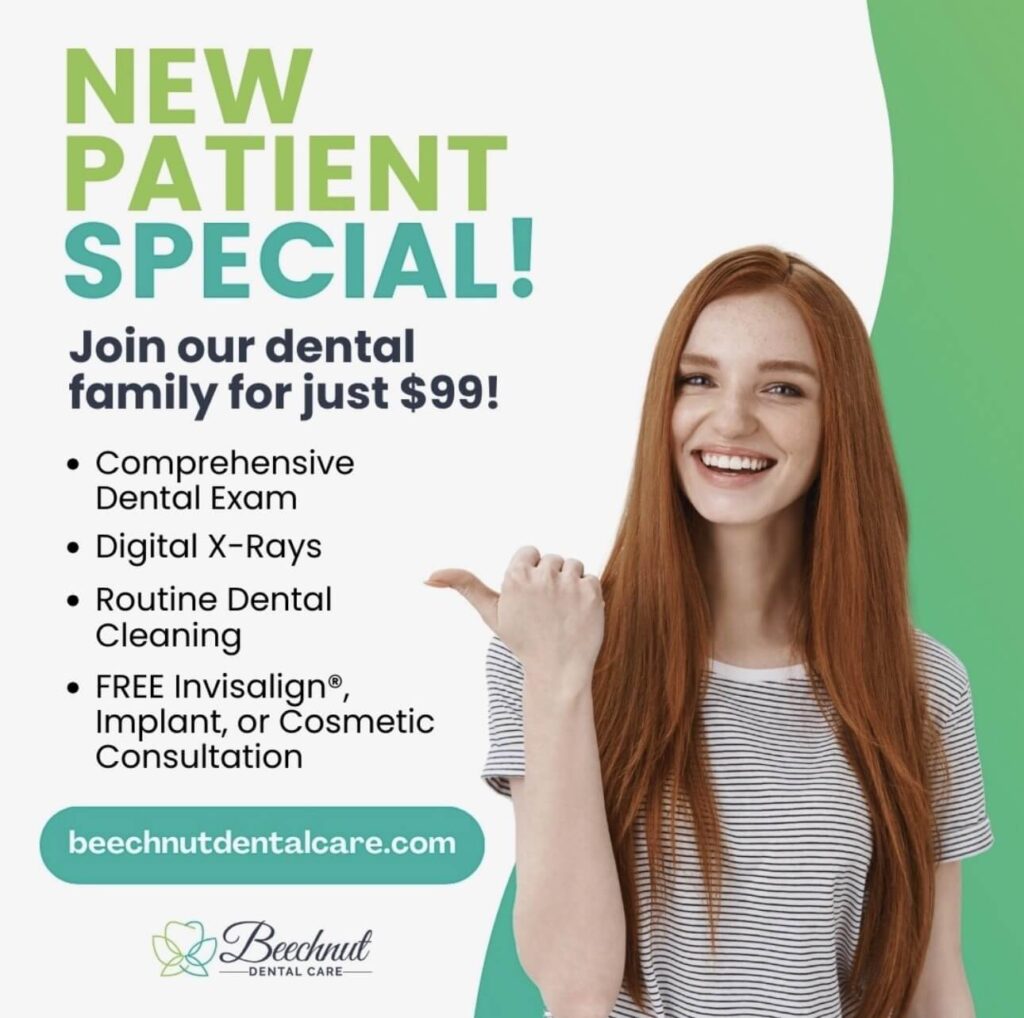

You’ve probably heard some form of the old adage “prevention is the best medicine.” It might sound trite, but there’s often good reason for certain commonplace medical truisms. The reason so many dentists emphasize preventative care is because that is truly the best way to avoid oral health issues altogether. At Beechnut Dental Care, we want to help you avoid unnecessary visits to the dentist with our cleanings and preventative dental care in Houston, TX.
Regular dental check-ups are crucial for sustaining optimal oral health. During these appointments, our dentists examine your teeth, gums, and oral tissues to identify any signs of potential problems.
At Beechnut Dental Care, we recommend most patients visit our Houston office every six months for routine check-ups. For those who require additional care, we may suggest an alternative recall schedule tailored to your specific circumstances. These regular appointments allow us to:
Each exam includes an in-depth evaluation of your teeth, gums, jaw, and supporting structures. We also review your medical history and discuss any concerns you may have about your oral health. These conversations help us develop a personalized preventive care plan that targets your unique health requirements.
A preventive program is a cooperative effort by the patient, dentist, and dental staff to preserve the natural dentition and supporting structures by preventing the onset, progress, and recurrence of dental diseases and conditions.
Preventing dental disease starts at home with good oral hygiene and a balanced diet. It is continued in the dental office by the efforts of your dentist and dental hygienist to promote, restore, and maintain your oral health.
Prevention also includes regular dental exams, cleanings, and x-rays. Sealants and fluoride are also great preventive treatments that help protect the teeth.

Our team offers several options for preventative care that range from screenings to professional cleanings:
A comprehensive dental exam will be performed by your dentist at your initial dental visit. At regular check-up exams, your dentist and hygienist will include the following:
Professional dental cleanings (dental prophylaxis) are usually performed by Registered Dental Hygienists. Your cleaning appointment will include a dental exam and the following:
When oral cancer is diagnosed in its earliest stages, treatment is generally very effective. Any noticeable abnormalities in the tongue, gums, mouth or surrounding area should be evaluated by a health professional as quickly as possible. During the oral cancer exam, the dentist and dental hygienist will be scrutinizing the maxillofacial and oral regions carefully for signs of pathologic changes.
The following signs will be investigated during a routine oral cancer exam:
Dental x-rays are essential, preventative, diagnostic tools that provide valuable information not visible during a regular dental exam. Dentists and dental hygienists use this information to safely and accurately detect hidden dental abnormalities and complete an accurate treatment plan. Without x-rays, problem areas may go undetected.
Regular professional cleanings remove plaque and tartar buildup that regular brushing can’t eliminate. This prevents tooth decay, reduces cavity risk, and preserves your enamel. Preventative treatments like fluoride applications and dental sealants provide additional protection by strengthening teeth and creating barriers against harmful bacteria in vulnerable areas.
Preventative care significantly enhances your overall oral health by:
Regular dental check-ups allow for the timely discovery of potential problems before they become painful and expensive. Dentists can identify:
Early intervention is always less invasive, less costly, and more effective than emergency treatment. The small investment in preventative care today prevents the need for complex procedures tomorrow, saving both discomfort and money in the long run.
At Beechnut Dental Care, the cost of deep cleaning procedures, also known as scaling and root planing, ranges from $90 to $1,800. This variation depends on factors such as the severity of periodontal disease, the number of affected teeth, and the extent of treatment required. Deep cleaning involves removing plaque and tartar buildup from below the gum line and smoothing the tooth roots to promote healing and prevent further infection.
Investing in deep cleaning is essential for maintaining optimal oral health, especially if you are experiencing symptoms of gum disease, such as bleeding gums, bad breath, or gum recession. By addressing these issues promptly, you can prevent more severe complications, including tooth loss and bone deterioration. Our team is committed to providing personalized care and will work with you to develop a treatment plan that aligns with your dental needs and budget. We also offer flexible payment options to ensure that essential periodontal care is accessible to all our patients.
Most patients should visit every six months for check-ups and professional cleanings. However, some individuals with specific oral health concerns may need more frequent visits as recommended by their dentist.
While daily at-home dental hygiene removes plaque, only professional dental cleaning tools can remove hardened tartar buildup. Dental hygienists use specialized instruments to clean above and below the gumline, reaching areas that toothbrushes and floss can’t effectively clean.
Think of preventative dentistry as the foundation for lifelong oral health. At Beechnut Dental Care, our comprehensive preventative services help you avoid costly and uncomfortable dental problems before they start. By combining advanced diagnostic technology with personalized preventative care, we ensure your smile remains healthy, functional, and beautiful for years to come.
Don’t wait until problems develop—invest in your smile today. Schedule your preventative care appointment to transform your oral health and boost your confidence. Together, we can help you maintain a smile that truly reflects your best self. Call us at (713) 839-0900 or complete our contact form to begin your journey to optimal dental health.